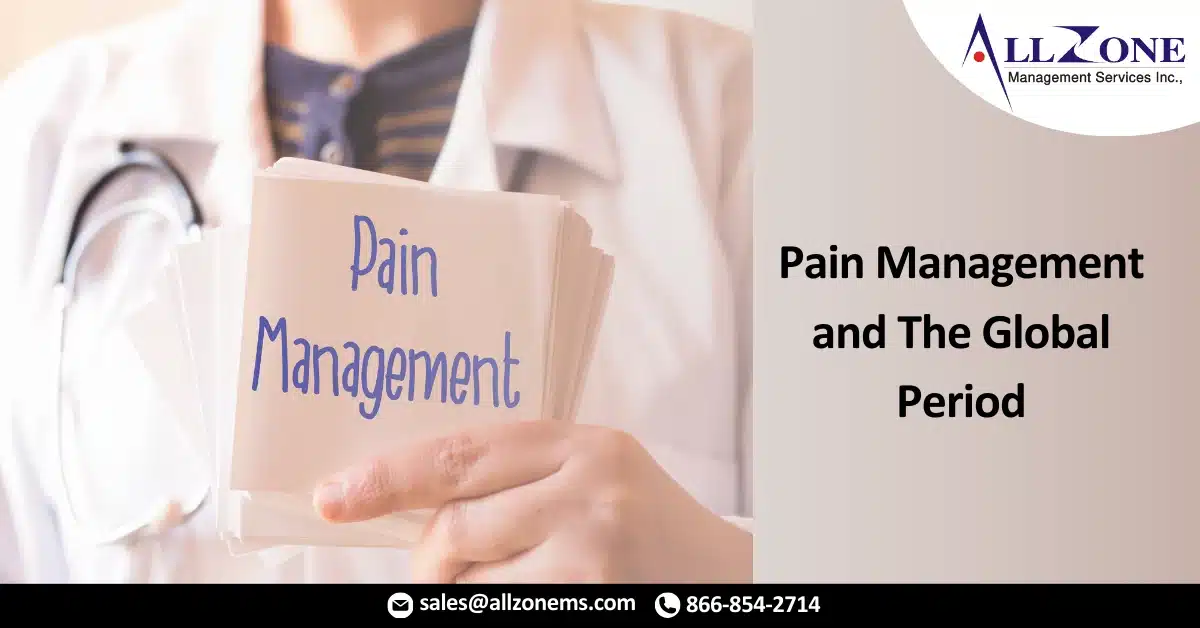Pain management during the global period of a procedure, if related to that procedure, is not separately reportable. If a provider other than the operating provider performs follow-up care, you must be careful to avoid “unbundling” of that follow-up care.
The global period, or global surgical package, bundles all care typically related to surgical service into a single payment. The Centers for Medicare & Medicaid Services (CMS) defines the global period to include:
- Pre-operative visits after the decision is made to operate. For major procedures, this includes pre- operative visits the day before the day of surgery. For minor procedures, this includes pre-operative visits the day of surgery
- Intra-operative services that are normally a usual and necessary part of a surgical procedure
- All additional medical or surgical services required of the surgeon during the post-operative period of the surgery because of complications, which do not require additional trips to the operating room
- Follow-up visits during the post-operative period of the surgery that are related to recovery from the surgery
- Post-surgical pain management by the surgeon
- Supplies, except for those identified as exclusions
- Miscellaneous services, such as dressing changes, local incision care, removal of operative pack, removal of cutaneous sutures and staples, lines, wires, tubes, drains, casts, and splints; insertion, irrigation, and removal of urinary catheters, routine peripheral intravenous lines, nasogastric and rectal tubes; and changes and removal of tracheostomy tubes
As emphasized by the bolded text, above, CMS includes “post-surgical pain management by the surgeon” as a defined component of the global package. Yet some providers may prefer not to furnish this care (or other bundled, post-surgical care), and instead wish to “outsource” this work to another provider.
For example, an orthopedic group practice may include an anesthesiologist to provide post-operative pain management. Because this care is part of the global package, however, the anesthesiologist cannot bill separately for these services. Or, a provider may contract post-operative care to a different provider. For instance, an orthopedic surgeon may pay an anesthesiologist “per patient” to manage post-operative pain. The anesthesiologist would bill the surgeon directly for services, but would not bill the insurer or patient.
There is another option that allows a provider to “unbundle” the surgical component of a procedure from the pre- and postsurgical care. If the provider who performs the surgical procedure, only (e.g., the “intraoperative” portion of the service), and does not furnish the follow-up care, the post-operative care is paid separately if the provider who performed the surgery and the provider who performs the post-op care agree on a transfer of care.
The provider who performed surgical care should append modifier 54 Surgical care only to the appropriate CPT® code(s) to describe the surgery performed. The modifier signals that the surgeon intends to relinquish “all or part of the post-operative care” to another provider, per CMS.
The physician who performs post-operative management services reports the same code(s) as the surgeon, but appends modifier-55 Postoperative management only. CMS advises, “Report the date of surgery as the date of service and indicate the date that care was relinquished or assumed. Physicians must keep copies of the written transfer agreement in the beneficiary’s medical record.”
Per Medicare rules, “Where a transfer of care does not occur, the services of another physician may either be paid separately or denied for medical necessity reasons, depending on the circumstances of the case.”
When appending modifiers 54 or 55, you must coordinate your coding with that of the physician who provides the other portion of care. Failure to cooperate in this way will likely result in one physician (usually the physician who provides postoperative care) missing out on reimbursement.
For More Information: https://www.aapc.com/blog/46644-pain-management-and-the-global-period/

